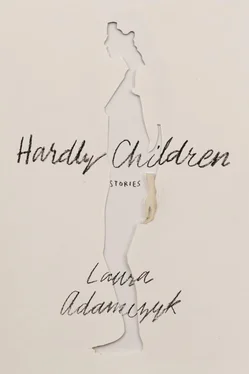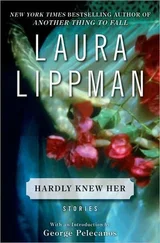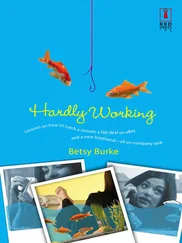In the bathroom Carla and I stood before its brightly lit mirror. She was in an advanced state of pregnancy. Everything looked the same—her sleek blonde hair, rosy cheeks, pert nose—except for her belly. It appeared constructed, like one of those grassy burial mounds downstate. When we’d first arrived, my aunt, a retired accountant who cut her own hair in a blunt schoolmarm, had placed her hands on Carla’s stomach, and with eyes closed like a fortune-teller, nodded and said, A new beginning.
We should get back home, I said. You know how he gets.
I’d grown anxious and wanted to dissolve into a more familiar state.
I know, Carla said. I’m pretty tired.
She rubbed her stomach, the very thing she promised she wouldn’t do. She’d paid an enterprising doula an outrageous sum for homemade anti-stress pregnancy tea, the tint and odor of rotten eggplant, and had been ostentatiously chugging it throughout dinner. I’d helped her to a glug of Chianti every time I got myself a glass, deepening the tea’s dark color. She either didn’t notice or pretended not to, but after pie, she sighed and said, I feel so much more relaxed .
I’m pretty tired too, I said, stroking my gut.
But we can’t not go, she said.
Carla and I lived in the same city a little over an hour away. Later she and her husband, Tom, would watch the latest Top Chef and go to bed, while I suggested to Jay that the two of us find a bar full of Christmas rejects to play pool with. Dad would end the night eating chips and dozing in front of a PBS murder mystery. We knew a version of this had become his reality this past year—and to me it sounded like a kind of bliss, an isolation you could really sink your teeth into—and yet. And yet he must have had his own feelings about it.
Oh, Dad, Carla said. Oh, sigh.
You always say, Oh, sigh . Why not just sigh?
She squinted at me. Your lips are all purple.
* * *
WE COULD HEARthe television as we walked up—Jay, me, Carla, and Tom. A laugh track pulsed through the door. The wind slapped me into an unwelcome awareness.
Hello, hello, Dad said, letting us in. Between his stick-straight hair gone gray and wire glasses forever in need of alignment, he looked like a community college physics instructor. In truth, he had been one of those baby boomers occupied with any manual labor that had kept our stomachs filled and his hands busy. He shuffled into the living room and, digging a remote out of his chair, muted the television. The resulting quiet compressed the room in a fast inhale. Each visit revealed the progression of a silent, certain spreading, as an anesthetic weighting one’s limbs. Surfaces grew new objects: cellophane bags of processed foodstuff Mom would not have bought and glossy magazines whose covers bore menacing interrogatives— Are Russians Reading Your Email Right Now? With Impending Food Crisis, Will Humans Be Forced to Eat Dirt? What Plans Does the Galaxy Have for Earth?
Dad led us to the wall in the dining room. On it there was a wooden spoon the length of a cane, a cross-stitch of a brown squirrel, and, at head height, a wooden box. Its walnut frame surrounded a square of black glass that reflected back to us colorless versions of ourselves. From the bottom right corner of the box hung a white electrical cord that ran behind the chest where Dad kept his cribbage set and playing cards. He flipped a switch on the cord, and a square of lights lit up around the box’s inner perimeter. Inside the lights, what was once dull became a glossy darkness that unfolded in a series of illuminated squares, deeper and deeper, as though an unending hallway.
Cool, Tom said.
You made this? Carla asked.
I did indeed, Dad said.
That’s really neat, she said.
Jay leaned in, bending his knees into a standing squat. He had the wide stance of a veteran ballplayer. He worked as an office building’s facilities manager and was used to taking things apart and putting them together.
What do we have here? he said. Two-way mirror?
Maybe, Dad said, smiling.
LED lights?
Dad squinted. What’s your name again?
At dinner, the two of them had talked about fermentation for half an hour before Dad realized that Jay belonged to me and not my cousin.
Carla said, It’s Jay , Dad.
Andie tells me you like to make things, said Jay.
I’ve got a whole workshop. I’ll take you down into my basement sometime.
I would love to get into your basement.
I stared into the box and blinked. The lights fuzzed then realigned to illuminate the box’s depth, the line of them pointing farther and farther away. It was really quite pretty.
Billions and billions , Jay intoned.
Sagan? Dad asked. Jay nodded and Dad patted his shoulder. We had been watching Cosmos and were filling our silences with Carl Sagan impressions.
So what’s the point of this, Dad? Carla asked.
Well, you know. He eyed Jay. I looked at Carla and back to Dad. The lights twinkled in stars off his glasses.
Just a neat thing to look at.
* * *
IT HAD ALL GONEa little something like this: There was golf on the television and a bunch of us sitting around. Me, Dad, Carla, Tom, aunts, cousins. They’d moved the couch into the dining room, a wheeled bed where the couch had been, Mom in the bed. For two weeks, Dad performed a circuit. He stood touching Mom’s ankles, went into the kitchen, ate a chip, descended into the basement to work, came back upstairs, ate a chip, went into the living room, touched Mom’s ankles. I found myself in the corner by the TV, ceding the spot nearest the bed to someone more aggressively watchful. Her breathing’s changing, Carla would say. She’s having trouble breathing. A man occasionally sank a putt and a crowd clapped politely.
My phone pinged every time a website I followed posted an update. A jet plane had gone missing. Two hundred souls misplaced. Everyone suspected a plummet into the ocean, but I had other ideas: Mom was going to pass from this life to the next, and the airliner would emerge from nothing. Light would flash, magnetic ions would rearrange themselves, and then blammo—the thing would rip out of a wormhole, a wrinkle in time, what have you. I didn’t know how the science worked, but something was hanging in the balance, that was for sure.
Near the end, Mom’s schoolmarm sister sang a hymn. She pulled a chair to the foot of the bed and told about going on a walk with Jesus. There had been a time when Mom worshipped, and even I recognized the refrain, but she hadn’t stepped inside a sanctuary in years. She had preferred walking very fast, and alone, on Sunday mornings, releasing some sweat, and eating as much breakfast as she could.
As she sang, my aunt looked deep into Mom’s face. If anything registered in her eyes it was ironic misery. Who knows if she had any thoughts besides, This sucks , the last words she’d spoken to me before falling into her uncomfortable silence. My aunt’s voice rose to an ungodly high. I tried to step into an emotion that that kind of thing might have unlocked, but I couldn’t do it. She was an awful singer. I shot a look to Carla that said, If you ever sing when I’m dying it had better be Talking Heads or Nirvana or full-on ironic ABBA and not some schmaltz I don’t believe in anymore . Her face reflected all the pain—high and low—that the situation merited. I appreciated her very much in that moment. The difference between us is that just then she started crying and I stepped outside.
I wandered down the block. I thought, Isn’t life funny? A woman’s about to slip out of the world, but it really is a beautiful day. It was warm for December—sun and breeze and whatnot. Cars were driving, squirrels were squirreling, everyone was going about their business just the same. It all countered but not quite erased the emotional disturbance I was feeling, like when people hang piney discs from the rearviews of their smoke-ridden cars.
Читать дальше











